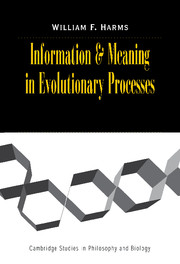Book contents
- Frontmatter
- Contents
- Acknowledgments
- Introduction
- PART I GENERALIZING EVOLUTIONARY THEORY
- PART II MODELING INFORMATION FLOW IN EVOLUTIONARY PROCESSES
- PART III MEANING CONVENTIONS AND NORMATIVITY
- Epilogue: Paley's Watch and Other Stories
- Notes
- Appendix: Proof of Information Gain under Frequency-Independent Discrete Replicator Dynamics for Population of n Types
- References
- Index
Introduction
Published online by Cambridge University Press: 28 July 2009
- Frontmatter
- Contents
- Acknowledgments
- Introduction
- PART I GENERALIZING EVOLUTIONARY THEORY
- PART II MODELING INFORMATION FLOW IN EVOLUTIONARY PROCESSES
- PART III MEANING CONVENTIONS AND NORMATIVITY
- Epilogue: Paley's Watch and Other Stories
- Notes
- Appendix: Proof of Information Gain under Frequency-Independent Discrete Replicator Dynamics for Population of n Types
- References
- Index
Summary
WHY EPISTEMOLOGY MATTERS
The nagging desire not only to gain knowledge but to understand the nature of knowledge itself arises in different ages for different reasons. The justification of religious truths and ethical precepts, the desire for certainty in an uncertain world – both have been effective at motivating inquiry into the fundamental nature of knowledge. In our era, a story can, perhaps, best illustrate the need. The story I have in mind involves a large rat trap. It also involves two young university professors, a celebrated theory war, about eight hundred undergraduate students, and a book by Thomas Kuhn. It is a true story, or at least it started out as a true story. This is how I remember it.
Young Professor B and young Professor S had been recruited from their respective departments, philosophy and German literature, to participate in an interdisciplinary extravaganza known as “Core Course.” Core Course was the sort of politically correct Great Books program common to large universities. Drudge work for the eight hundred students (assignments, grading, one-on-one contact, and daily class time) was handled by twenty or thirty “teaching associates” (second-year graduate students), staff meetings once a week. Young Professors S and B were accorded starring roles in this production, giving primary content lectures to the eight hundred students in two shifts, the auditorium being limited to half that number.
- Type
- Chapter
- Information
- Information and Meaning in Evolutionary Processes , pp. 1 - 12Publisher: Cambridge University PressPrint publication year: 2004



